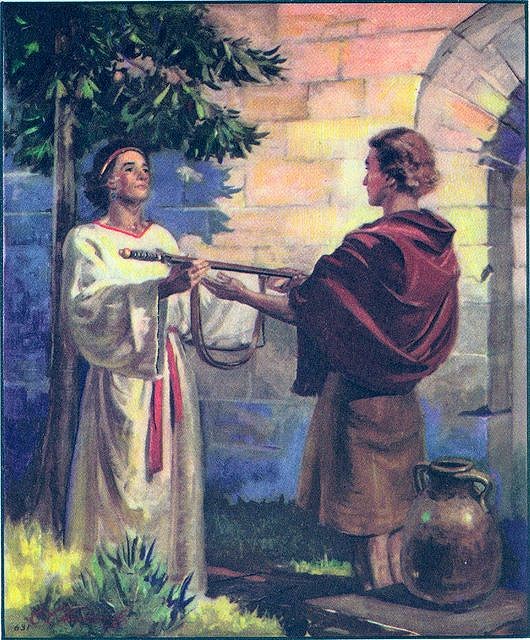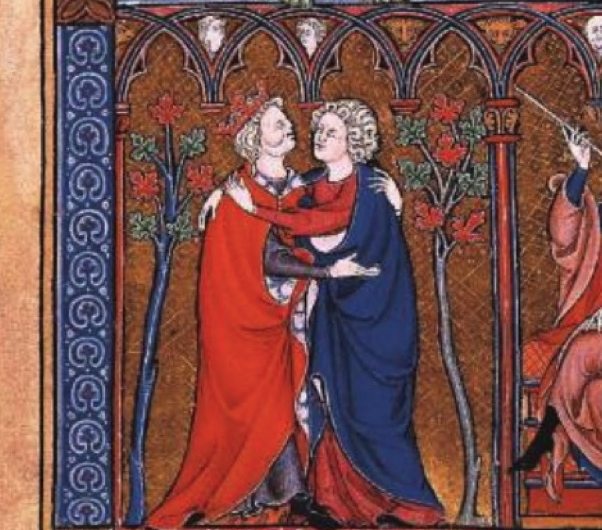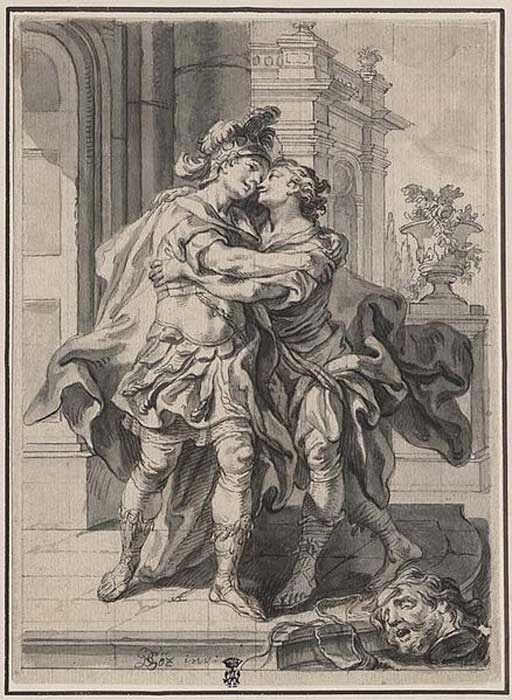Disclaimer: This Card Talk delves into the relationship between Jonathan, son of Saul, and his friend, brother-in-law, and possible lover, David. This is a long one, and this time we might actually piss off everyone. That’s not our intent, but we’ll see what happens. As always, comments are open below and here is our contact info.
What Brings Us Here
This card has an interesting history. It was one of the first cards made when the game was being put together. In the original release of the deck (which some of you may have) it read “David and Jonathan coming out as being only good friends.” We changed this in later revisions of the main deck for two reasons: 1) we had no Bible passage to support that assertion, and 2) it seemed purposely anti-LGBTQA+, which we aren’t.
So we created this card instead— “Jonathan's David-love.” (2 Samuel 1:26)— the text of which, with a little context, reads as follows:
Jonathan lies slain upon your high places.
I am distressed for you, my brother Jonathan;
greatly beloved were you to me;
your love to me was wonderful
passing the love of women.
~ 2 Samuel 1:25c-26
These words are contained in the song David supposedly wrote and sung mourning Jonathan’s death in battle. David speaks of his great love for Jonathan, while also noting Jonathan’s love for him. So let’s unpack the history of these two men to understand the nature and depth of their love.
David and Jonathan: A History
D & J first meet in chapter 18 of the book of 1 Samuel after David’s famed defeat of Goliath.
When David had finished speaking to Saul, the soul of Jonathan was bound to the soul of David, and Jonathan loved him as his own soul. Saul took him [David] that day and would not let him return to his father’s house. Then Jonathan made a covenant with David, because he loved him as his own soul. Jonathan stripped himself of the robe that he was wearing, and gave it to David, and his armor, and even his sword and his bow and his belt.
~ 1 Samuel 18:1-4
These are Jonathan’s feelings and action after meeting David for the first time: in love, he bound his soul to David’s, made a covenant with him, and stripped himself of his royal/military vestments, making them a present to David.
Oh we can hear the fighting being already…
Conservative Response: Jonathan’s actions were divinely inspired, not romantic! God placed Platonic, friendship, loyalty-type love in Jonathan’s heart; his actions were demonstrating a future political reality. God had already rejected Saul as King (1 Sam 15) and had the prophet Samuel anointed David as the future king (1 Sam 16). Even if Jonathan did not know it at the time, he was acknowledging David as the divinely appointed king. He was conferring his allegiance and symbols of power due to God’s chosen one. This was all God’s plan, not some smutty homo-erotic scene not even fit for Songs of Solomon, which is definitely about Jesus, but that’s another conversation.
Liberal Response: What are you talking about?! Jonathan’s actions were divinely inspired, and romantic! We thought you Conservatives believe in the unlimited power of God. Why can’t it be both? God used the romantic love in Jonathan’s heart to bring about the future reign of His chosen king. Yes, Jonathan’s gift were political, demonstrating his allegiance to David, binding his soul and loyalty to him. But that is because he was in love with him! Look at the language. Look at the immediacy. This is “love at first sight” for Jonathan. His gifts are gifts of affection. He never had a chance after seeing David in battle. And God is using what is inside of Jonathan to further His divine ends.
D & J’s relationship gets more complicated after this. Pretty soon, Saul wants David dead. Lucky for David, Saul confines in Jonathan, and Jonathan has David’s ruddy back.
Saul spoke with his son Jonathan and with all his servants about killing David. But Saul’s son Jonathan took great delight in David.
Jonathan told David, “My father Saul is trying to kill you; therefore be on guard tomorrow morning; stay in a secret place and hide yourself. I will go out and stand beside my father in the field where you are, and I will speak to my father about you; if I learn anything I will tell you.”
Jonathan spoke well of David to his father Saul, saying to him, “The king should not sin against his servant David, because he has not sinned against you, and because his deeds have been of good service to you; for he took his life in his hand when he attacked the Philistine, and the Lord brought about a great victory for all Israel. You saw it, and rejoiced; why then will you sin against an innocent person by killing David without cause?” Saul heeded the voice of Jonathan; Saul swore, “As the Lord lives, he shall not be put to death.”
So Jonathan called David and related all these things to him. Jonathan then brought David to Saul, and he was in his presence as before. (1 Samuel 19:1-7)
However, this reprieve only lasts for a while; Saul tries to kill David anyway. Only this time it’s David’s wife Michel— Saul’s daughter, Jonathan’s sister— who helps him escape the king’s wrath (1 Samuel 19: 8-17).
It’s chapter 20 of 1 Samuel that really shows the depth and breadth of their relationship.
After his escape, David and Jonathan meet up to talk. Jonathan just can’t believe that his father tried to kill David, especially without talking to him first. David, always the politically shrewd operator, says “Your father knows well that you like me; and he thinks, ‘Do not let Jonathan know this, or he will be grieved.’ But truly, as the Lord lives and as you yourself live, there is but a step between me and death” (vs. 3). So the boys make a solemn covenant between themselves, their families and decedents:
If I am still alive, show me the faithful love of the Lord; but if I die, never cut off your faithful love from my house, even if the Lord were to cut off every one of the enemies of David from the face of the earth.” Thus Jonathan made a covenant with the house of David, saying, “May the Lord seek out the enemies of David.” Jonathan made David swear again by his love for him; for he loved him as he loved his own life. (1 Samuel 20:14-17)
This covenant results in Jonathan betraying his father to further effect the escape of David (vs 24-42). At their last meeting in life
[David] prostrated himself with his face to the ground. He bowed three times, and they kissed each other, and wept with each other; David wept the more. Then Jonathan said to David, “Go in peace, since both of us have sworn in the name of the Lord, saying, ‘The Lord shall be between me and you, and between my descendants and your descendants, forever.’” (41-42)
And here we go again…
Conservative Response: Once again, this is political loyalty, not romance. They both understand that a civil war is about to break out, and Jonathan’s allegiances are going to be torn between his father— whose throne is he supposed to inherit, for whom he is a general in his army—, and his best friend, who is also married to his sister. Both men repeatedly discuss and vow to protect each other’s lineage, no matter who wins the inevitable war between Saul and David’s forces. This loyalty is, again, built off of their friendship, but also the holy bond God put between the two of them; hence, the convent language they employ which, as clear from its use elsewhere in the Bible, is legal in nature, not romantic.
Liberal Response: Right, and why would Jonathan choose David over his father, choose a stranger from another tribe, over his own people? Love. He is rebelling against his family, his nation, to protect his one true love. The impact of what you conservatives say may be true, but that is an afterthought for Jonathan. He is focused on the man, not the mission. His primary motivation is to do all he can to safeguard the love he had bound his soul to. And they are crying and kissing! What more proof do you need? Where is the “politics” in those actions?
Conservative: That is so much hogwash and balliwho! It is not that kind of love! And the text doesn’t say they were kissing on the lips. It could have a holy, regal kiss on the cheek, forehead, or hands, you moral degenerate!
Liberal: Oh it “could have been”? That’s a lot of supposition from the “be silent where the Bible is silent” camp, you homophobic asshole!
US: Okay people: let’s play nice. Does either matter? Yes. Of course it does. But are you actually thinking about why it matters? Because in truth, this debate tests the bounds of how you view and tolerate the differences between being homosocial and homosexual. And how comfortable you are with each.
Homosocial vs Homosexual: Love, Love, Love
In layman’s terms, homosociality defines the social bonds between members of the same sex, though usually people only use it to describe men (because it’s not culturally “weird” for women to form strong social bonds. People are stupid.). Homosexuality is about romantic bonds between members of the same sex, and once again, people often find relationships between men something worthy of more discussion and less fetishized than same-sex romantic relationships between women. They are the “this far and no farther” boundaries that we place on same-sex relationships.
Our card’s verse notes that David claimed Jonathan’s love was “wonderful,” the Hebrew of which translates to mean “beyond comprehension.” Furthermore, David said that Jonathan’s love was greater than the love of women.
This is noteworthy because, depending on how one navigates the pronoun swamp of 1 Samuel 20:17, this is the only time in the Bible where it says David loved Jonathan back. Something artists over the centuries have noted, almost always making Jonathan’s affection for David more prominent. Hence the diction of our card.
This gets even more awkward when we remember that David was married to Jonathan’s little sister, and the later drama in their marriage [the Card Talk about this is forthcoming]. Is Michal the woman David had in mind while thinking of Jonathan’s love? The comparison is made more interesting when we note that Bible records the love between David and Jonathan as a two way street, while with Michel it only records Michel’s love for David (c.f. 1 Samuel 18:17-28).
Seriously you two…?
Conservative Response: Exactly! Jonathan’s love of David was better than Michal’s, which proves his love was non-sexual, non-romantic! The writer is contrasting the two against each other. The writer of 1 Samuel is not contemporaneous with the events. Therefore, he knows the rest of David’s story and his romantic, sexual relationships with women. No woman’s love was ever as profitable to David as Jonathan’s. Not Michal or even Abigial. Not Ahinoam, Maacah, Haggith, Abital, or Eglah. Certainly not Bathsheba, to say nothing of his other wives and concubines.
Liberal Response: First off, what’s that crack about Bathsheba, as if she did anything other than be power-raped by the king, and then have her husband, one of David’s “mighty men,” murdered? Victim-blame much? And second, once again, you’re proving my point. Jonathan and Michal are on the same wavelength: they both betray the same family, the same father, for David. And both do it because they are in love with him: sexually, romantically. That’s the point of comparison. They both loved him, but Jonathan’’s love was better which, as you say, is borne out by the writers/redactors knowing how David and Michal’s relationship will fall apart in a few chapters (c.f. 2 Samuel 6:20-23). At the very least we can say David was so damn hot, none of Saul’s kids could resist him.
An interesting academic sidestepping of this debate is well articulated by Baruch Halpern.
Halpern argues that the “special relationship” between David and Jonathan— however one would present it— “is probably invented or inferred, not recalled” by the biblical writer(s), for the express purpose of insulating David from blame against charges “that David conducted a vendetta with the house of Saul” (283). In other words, the whole relationship is political-romantic fiction to paint David as less vindictive and bloodthirsty in regards to Saul’s lineage.
Don’t dismiss this idea out of hand. David is pretty ruthless throughout his narrative. He is introduced by way of talking about the wild animals he kills before he chops off Goliath’s head with Goliath’s own sword (yeah, that’s how he died, not the slingshot. Your flannel graph lied). And he exits the Bible giving Solomon a list of people to have killed once he’s gone, including his own cousin Joab, who was only ever loyal to David, esp. when it came to killing people for him.
Halpern (among others) points out that the Bible spends a lot of time establishing that David didn’t lead a coup against Saul or exact revenge against his descendants once David took power. David didn’t kill Saul when he had the chance, twice (1 Sam 24 & 26). Saul and his sons all end up dead by Philistine hands, when David was in a whole other region (compare the end of 1 Sam 30 to chapter 31). When the a grip of Saul’s descendants are massacred by the Gibeonites, the text makes it clear that, though David handed them over to be killed, it’s because God ordered the hit. None of his forces, nor any Jews, took part in the slaughter, and he made sure Jonathan’s physically disabled son Mephibosheth made it out alive (2 Sam 21:1-14). The point: maybe the text is being suggestive for the specific purpose of showing how close they were so later generations wouldn’t think poorly of the Davidic Monarchy. A plan, if true, that has historically had mixed results among scholars and lay people alike.
As interesting as this idea is, we assume neither foaming-at-the-mouth disputant above will spend a lot of time considering Halpern until what is the primary concern in their minds on this issue: what was David doing or not doing in the privacy of this bedroom?
Two Open Letters
So what do we think? Do we side with the “Conservatives” or the “Liberals”? Honestly, we don’t really care. We’re more interested in the ideologies behind the debate. Because we often notice two ideas lingering in the back of some minds coming from both positions.
Conservatives seem to say, “Men in the Bible can’t be loving and intimate,” while Liberals seem to say, “Men in the Bible can be loving and intimate only if they are gay. “ So we want to address both sides, ask each two essential questions.
Dear Conservatives,
why are you so bothered by the idea that the Bible would show a happy homosexual couple?
(We think we know why, but do you? Do you really?)
Before you start quoting Leviticus 18:22 (or other passages horribly out of context), ask yourself something: Could David be a “man after God’s own heart” and not “straight”?
As we (and any clergy, lay leader, or biblical reader with basic reading comprehension) has noted, the Bible records that David was
a repeated liar (c.f. 1 Sam 21 & 27)
an adulterer (2 Sam 11)
one of the worst fathers recorded in the Bible (2 Sam 13-18)
a nationalistic idolater cursed by God (2 Sam 24),
sexually unchaste (too many examples to name), and
a murder and betrayer of his own friends and family (c.f. 2 Sam 11; & 1 Kings 2).
But you want to focus all your attention on his possible sexuality, especially when, according to your own logic, that might have been a high point in his narrative?
Ask yourself: what if Jonathan was in love with David romantically, sexually? Maybe David loved him back in that same way. Maybe David was bi-sexual or pansexual. We don’t know. You don’t know. But were God’s ends thwarted? Were the elements of David’s life which led to the coming Messiah disrupted? Did the world come crashing down? Didn’t all the things you argued for above still take place in God’s timing? Couldn’t God have worked through their “sin,” whether He “hated” it or not?
So why are you so hung up whether there is something evil and/or disgusting about the idea that they were sexually attracted to each other, whether they found a way to physically consummate their love or not?
No. Stop.
Read the above again. Slowly. Honestly. Non-defensively. If you believe being “gay” is a sin, and we are all “sinners,” including David and Jonathan, why couldn’t “gayness” be one of their sins, and God still used them, just like you argue that God uses rest of us flawed, sinful people? Just like God still uses you.
If you don’t have a good answer for that question, you need to do some soul-searching, and stop wondering why you’re accused of “homophobia” by Liberal friends, family, and acquaintances more often than you’d like.
Dear Liberals
why are you so bothered by the idea that the Bible would show intimate, non-sexual love between men?
(Again, we have our suspicions, but have you worked that out?)
Defending the “least of these” is supposed to be your bread and butter. Social justice warrior-ing is not only biblical, it has become second nature for you. This is not a bad thing, usually it is to be commended. Any the fight against homophobia, transphobia, and the myriad discrimination experienced by the LGBTQA+ community, especially at the hands of the church, is a noble one. It is what Jesus would do.
So finding a positive depiction of a same-sex couple in the Bible would be a wonderful, affirming counterpoint in the midst of a book with passages like the one above from Leviticus. And let’s be blunt: LGBTQA+ folk can see themselves in an all too-familiar narrative: two young people living double lives— their love denied by an overbearing father and unforgiving social system— are forced to meet in secret to discuss their love.
But doesn’t it feed a culture of toxic-masculinity by saying the only way this passage makes sense is by saying David and Jonathan we’re sexually intimate? Isn’t something important lost if we purport that the text can only be interpreted as a romantic relationship, propping up the notion that men cannot be emotionally vulnerable and physically affectionate in public without that being socially taboo?
No. Stop.
Read the above again. Slowly. Honestly. Non-defensively. Is it possible that you’re screaming, “look at the text, they HAVE to be gay!” sadly and ironically based on bro-culture, misogynistic, and/or homophobic ideas of what it means to be “a man” (i.e. “real men” don’t act like this, unless they’re gay.)?
If you don’t have a good answer for that question, you need to do some soul-searching, and start wondering if you’re not as “woke” as you think; if you’re more self-loathing than you were aware.
Perhaps you should re-read everything we said above before you send us hate mail.
Perhaps we should all do a better job of prioritizing what we focus on and why.
Or better still, perhaps we can work on loving each other, as Jonathan loved David, as Christ loved the Church, and be willing to give our everything for others wonderfully made in the image of God, no matter who they choose (or don’t choose) to share their consensual love with in a romantic way.
But what do we know: we made this game and you probably think we’re going to Hell.










Absalom knew that lighting shit on fire is appropriate when attempting to catch the attention of an unjust system. Thus, Amnon, King David, and their "boys will be boys" bullshit attitude, got exactly what they deserved.